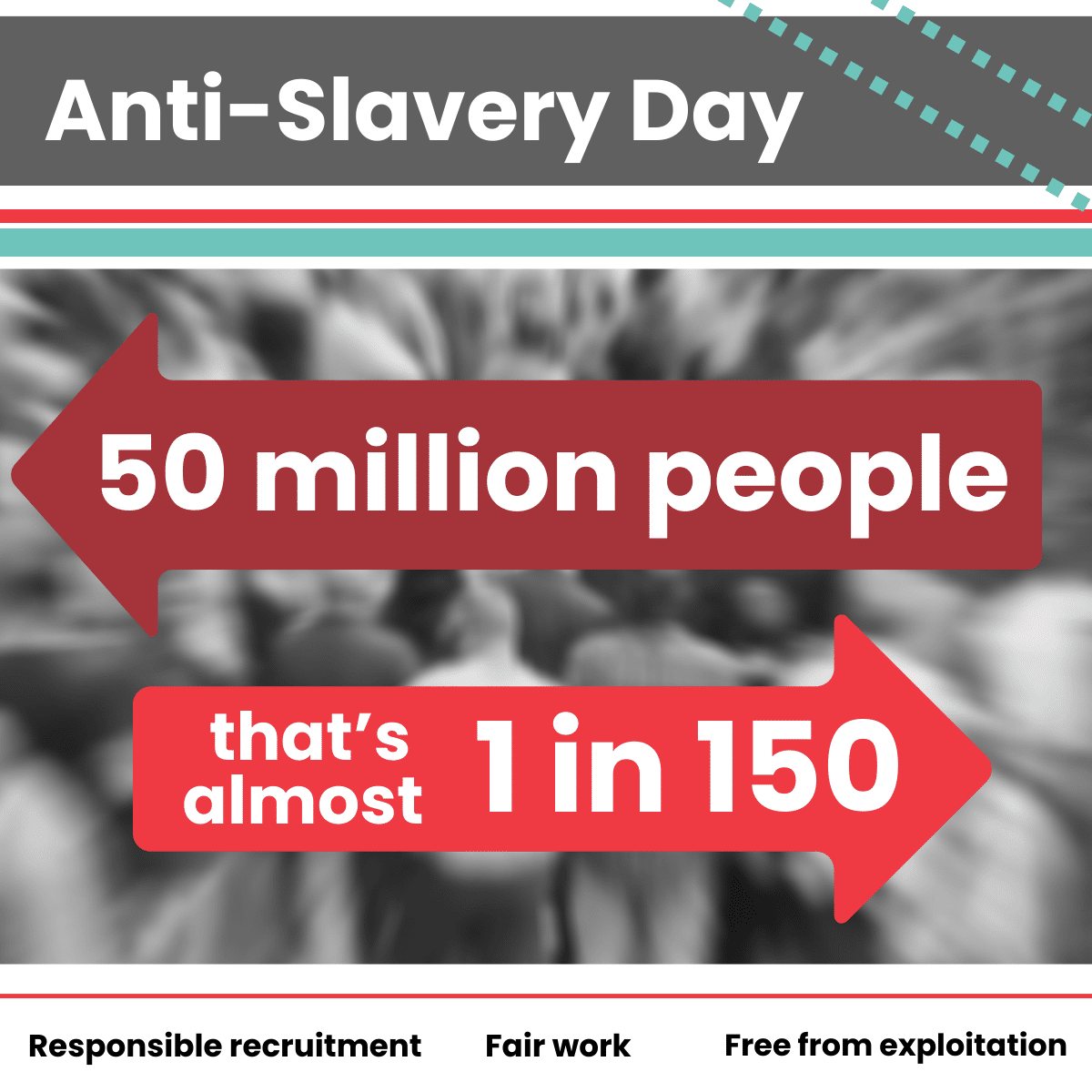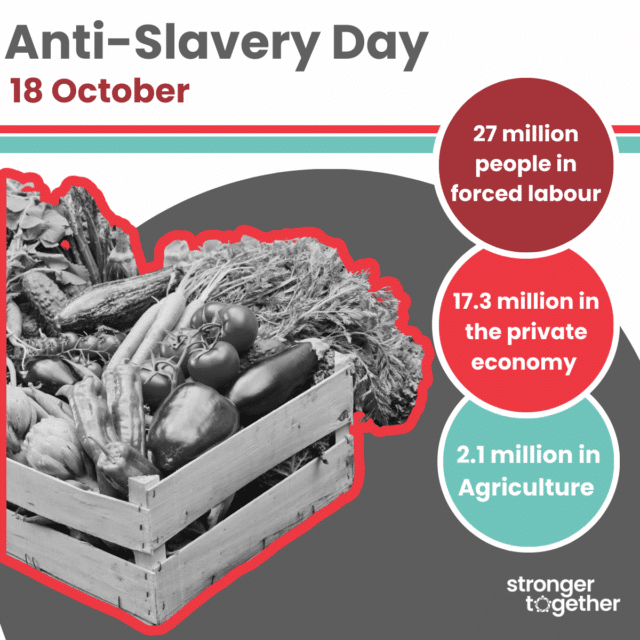
Anti-Slavery Week offers us, and many other responsible employers, a chance to shine the spotlight on this devastating issue that affects so many, including how to spot the signs and how to safely report it.
It can affect anyone – men, women, or children, of all different backgrounds, religions, and ethnicities. There is no ‘typical’ victim of modern-day slavery, and it occurs worldwide, in countries across all continents – it’s not particular to a specific area or region.
But what actually is modern-day slavery?
Modern-day slavery takes many forms, all of which involve some form of exploitation of an individual (or a number of individuals) and forced action or control of that individual in some way.
These forms include:
- Human Trafficking: Where a person is moved from where they’re living by force, fraud, or deception and made to do things against their will; commit crimes, be pushed into marriage, be made to work for little or no pay.
- Forced Labour: Where someone is made to work under the threat of being penalised or punished in some way if they don’t, or when they haven’t offered to do that work voluntarily.
- Bonded Labour or Debt Bondage: This happens when someone is forced to undertake work to pay off a debt. They are forced into working for little or no pay, and they have no control over the debt, so it may well be increased by the person exerting control over them.
- Child Exploitation: Where a child is exploited for someone else’s gain. That gain doesn’t have to be monetary. The child can be forced to be a soldier, be forced to marry, or be forced into domestic servitude (see below for more details on this).
- Forced and Early Marriage: Where someone is forced to marry another person against their will. This includes, sadly, child marriages.
- Criminal Exploitation: Where someone is forced into a life of crime, such as carrying and/or selling drugs, theft, or fraud.
- Domestic Servitude: This is when someone is forced to work in another person’s home; cooking, cleaning, and looking after their children, for little/low pay – with very little freedom.
- Sexual Exploitation: Where someone is forced to commit sexual acts, against their will, or pushed into prostitution.

The bigger picture
To begin to understand the problem and how to address it, we really need to understand the sheer scale of the issue.
So here are some facts about modern-day slavery.
- Worldwide, around 50 million people are trapped in modern-day slavery – greater than the population of Spain or Argentina.
- Of those 50 million, 122,000 are in the UK alone.
- 27 million people are in forced labour.
- 22 million people are in forced marriages.
- Modern-day slavery is one of the largest (and most lucrative) illegal trades around the world – more profitable than the illegal drugs trade.
- One in four victims of modern-day slavery are children.
Modern-day slavery: spotting the signs
It may not always be obvious, but there are certain things you can look out for that may tell you if someone has become a victim of modern-day slavery, allowing you to raise the alarm.
A few things to look out for are:
- Does a worker look to be under the control of others?
- Do they seem unfamiliar with the area or place of work?
- Do they tend not to interact with colleagues?
- Do they lack any personal ID?
- Do they wear the same clothes day after day?
- Do they avoid eye contact?
- Do they seem frightened or hesitant to talk?
- Do they look malnourished or unkempt?
- Do they show signs of physical or psychological abuse: injuries, anxiety, agitation?
- Do they appear to be scared, withdrawn, or confused?
If you spot any of these signs in a worker (or workers) who comes to you through Indeed Flex, please let us know immediately, by emailing our UK Compliance team at [email protected] and we’ll get back to you as a matter of urgency.
Get involved: here’s what you can do to help
As a business
- Encourage your team to report any concerns they may have, or seek advice on modern slavery issues, using this helpline: 08000 121 700
- Partner up with an organisation like Unseen, Stronger Together, or the Association of Labour Providers (ALP).
- Create a team of dedicated Modern Slavery Champions within your business whose job it is to raise awareness of the issue (among both colleagues and those in your supply chains) and make sure you’re compliant with the Modern Slavery Act.
- Donate to relevant charities or organisations, such as the UK Modern Slavery & Exploitation Helpline
- Download a free good practice checklist, containing guidance on embedding responsible recruitment and fair work into your business.
- Download the Unseen app across your organisation (search for UnseenUK in the Apple Store or Google Play Store), to empower workers to act as vital points of contact for potential victims.
- Download and print the A5 posters found on this link and put them up around your site(s) in visible spots, such as canteens or communal areas.
As an individual
- Spot the signs early and look to get help for the individual(s).
- Raise funds to help bring modern-day slavery to an end: skydive, run a marathon, have a bake off.
- Encourage businesses, friends, family, and colleagues to do what they can to prevent human trafficking and protect victims of modern-day slavery.
- Lobby local and central government, to get them to crack down on modern-day slavery.
In summary
This week offers the chance to reflect on this worldwide issue and think what we can do to prevent it from happening but, in truth, it takes year-round dedication if we’re all to help stop modern-day slavery.
By being aware of the different forms of exploitation and the shocking facts and figures behind them; by remaining vigilant and looking for the signs; by implementing new policies in the workplace; and by teaming up with certain organisations, we can all play our part.
That all important helpline number again: 08000 121 700








